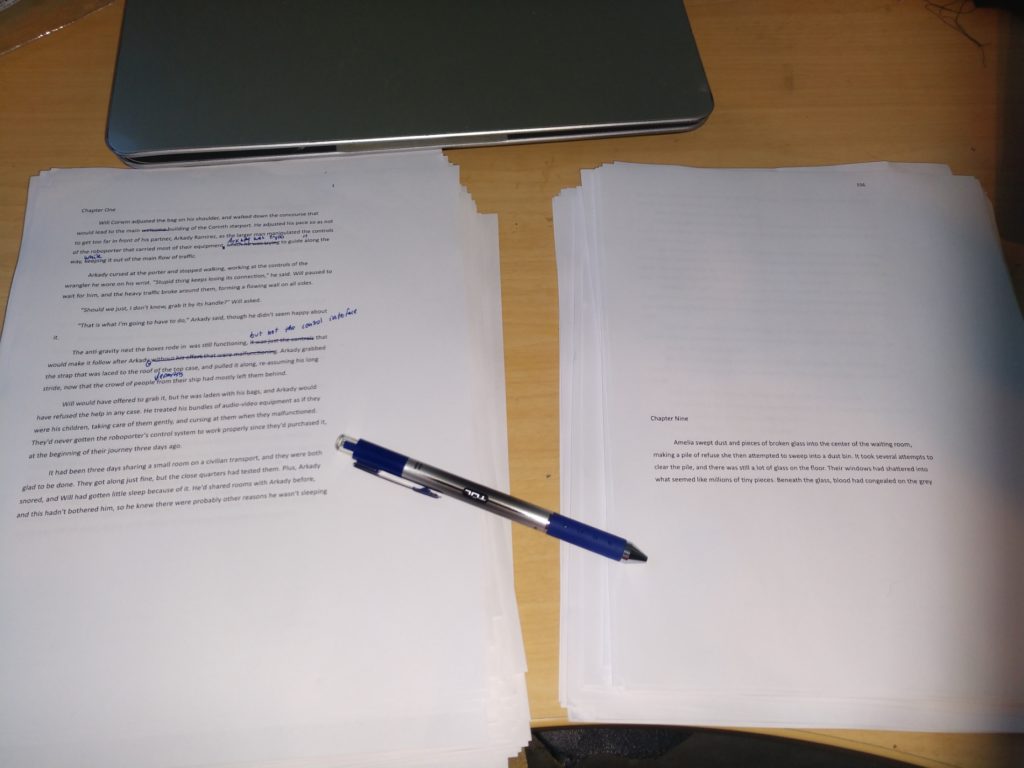
It’s been a year since I started writing at least 1000 words a day, every day. I can honestly say the habit kind of kicked my butt and changed my life at the same time. I wrote every day from May of last year through October. After that, I started taking Sundays off. I still take one day off a week, but a couple of months ago a friend and I started hanging out after work on Saturdays, so now Saturdays are my day off. In this time, certain things have become clear.
My process is my process and it works for me if I trust it.
I’ve developed a process over the years. When I first start drafting something, I type it in green text. The next day, I go back and edit everything in green, then convert it to black. From there, I start that day’s 1000 words in green and the process repeats. This means I kind of write two drafts at once, so my completed ‘first drafts’ are really second drafts. I know a lot of experts say not to edit as you go along, that it kills the creative process, but I found out that was not true for me. I need to edit as I go along, if only to remind myself where the fuck I am in the story. I’ve found that when I reach the end of the 1/2 draft its much stronger and doesn’t usually need a full rewrite, though I still do need an editor, but more on that later.
The Map is not the Mountain
I used to hate the idea of outlining. I thought that when I had a detailed outline, I would lose interest in the project. I would have already followed it the story through to its conclusion, so there was no more joy of discovery, which would have killed me. This led to me wandering into drafts with no clue where I was going, at which point I would get to the halfway or 2/3 mark and end up hopelessly lost and not able to finish. So, that was no good either. I found out that the kind of outline I’d tried to use before was definitely too detailed and structured, but that there were other kinds of outlines. I finally started to use what is referred to as a tentpole outline, which is when you have the major moments planned out, but you have a lot of freedom for how you get from point a to point b. Now, I don’t do my outlines on the computer. I scribble out a flowchart-looking thing on a couple of pages in my moleskine notebook. This gives me a map to follow, and a list of scenes to write, but leaves me a lot of freedom to wander. And wander I do. The ideas I come up with while drafting are always better than the ones I come up with while outlining, but I need that scaffolding, weak as it is, to keep me on track.
I did use the Save the Cat model to outline Among the Captive Stars and it worked for me, but I still ended up with much better stuff when I departed from it. It also seemed to want me to hew more closely to a formulaic approach than I was comfortable with. So, I’ve gone back to the tentpole outline in subsequent books.
An Editor is not Optional
I am independently published, so I could have released all of my books using only myself as an editor. That would have been a giant mistake. I hired an editor (Hi Courtney) pretty late in my process, after about three drafts. I hired her to do mostly copy editing, but she was great in a lot of ways. She fixed all of my bad habits, and also pointed out some things I was doing I had not noticed. She also suggested that the title I was using for the book was probably no longer fitting, and she helped me brainstorm new ones. She was a godsend and more than earned what I paid her. If you find errors in All the Promised Stars it was probably because I changed some things at the last minute, after she’d already been through it. Everyone needs an editor. It is not a badge of shame.
Some things get easier with time
This is something I’ve just started to notice recently, but it used to be that I’d have an idea how a scene was going to go, but when I went to write it it just wouldn’t come out like I intended. I did a lot of rewriting to get things in shape, which was fine. But lately I’ve found that when I envision a scene, my skills have developed to the point where I can pretty much make it come out more like what I had in mind. This is a recent phenomena. I think it basically comes down to practice. I’ve put in a shitload of practice over the last year, and I think it’s starting to pay off.
So, those are the major takeaways from the experiment. I have written almost four books this way, in that time. It has been the first time I’ve finished even one book since 2009. The plan is to keep going, because it’s working, and I haven’t gotten burned out, like I was afraid of doing. I plan to release another two books this year, so we’ll see what all of this turns into.
